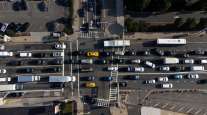Port of Virginia Truckers Get a Chance to Unload on Board Members

Enough already. That seemed to be the rallying cry for some truckers who got the chance on March 27 to vent about port congestion directly to the Virginia Port Authority Board of Commissioners.
While the Port of Virginia has been wrestling with the issue for some time – a “Motor Carrier Task Force” was formed about four years ago to deal with chronic truck backups at its terminals – the problems seem as acute as ever and top port officials say they know it.
“I’m going to be frank; we are experiencing some pain and it is a pain that’s also impacting our partners,” said John Reinhart, the executive director and CEO of the Virginia Port Authority, in remarks at the start of the authority’s March 27 board meeting, held at Virginia International Gateway in Portsmouth, Va.
While the meeting would unfold as usual, with the normal reports and committee updates, it ended with a mini-town-hall format in which truckers and anyone else could address the board.
“We’re going to listen today,” Reinhart said.
The added session took about a half-hour and included nine speakers.
“Our ability to make a living is at the mercy of personnel and systems that have no consideration or respect for our time or our livelihoods,” said George Berry, who directs a local advocacy group called For Truckers By Truckers.
The problem is that federal law limits truckers’ time on the job to 14 hours, of which only 11 can be spent driving. Many are paid by the mile or the number of loads they carry; few are paid by the hour.
Trucker Leo Cappuccio said it can take two to five hours to get in and out of VIG.
“We hate VIG; we really do,” he said.
There were some bright spots. On March 1, the port began to phase in a long-awaited appointment system at Norfolk International Terminals, which Reginald Porter, an otherwise frustrated trucker, said was working “perfectly” for him.
Art Moye, executive vice president of the Virginia Maritime Association, described in sum an “operational perfect storm” of congestion, construction, equipment breakdowns, steamship-line changes and an exhausted workforce.
“We have some serious, serious problems,” he said, while noting that top port executives are on the case, fully aware of the seriousness of the situation.
Distributed by Tribune Content Agency, LLC




